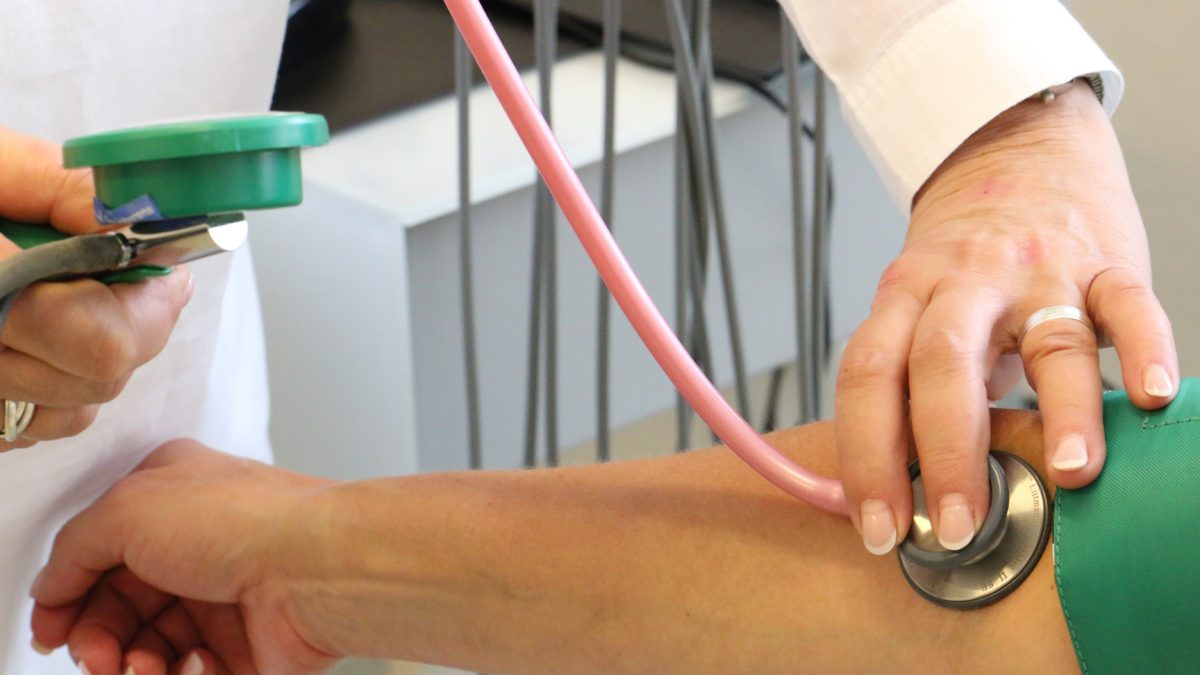
Hypertension: What is High Blood Pressure all about?
Hypertension is the name for high blood pressure, which is a very common problem today.
It’s possible for blood pressure to creep up to dangerous levels. When this happens your whole body can become very stressed.
One of the main culprits is narrowed arteries, which happens mainly because of poor diet.
When the arteries narrow, blood struggles to get through them.
The heart has to work hard to get the blood through your arteries and veins, and this literally wears it out.
While healthy arteries and vessels are strong and elastic, blood can flow through unobstructed.
High blood pressure toughens and tightens these essential passages, leading to damage and dysfunction.
Dietary fats start to form deposits in them, further restricting the blood flow, and before you know it,you have a serious problem.
The worrying thing is that it can take many years (or decades!) to develop, and in this time you probably won’t notice anything is amiss.
Using the US as an example, the scary fact is that almost half of American adults will be diagnosed with high blood pressure. That’s no small number!
Even when symptoms are not obvious, you could still be sustaining gradual damage to the heart, brain, organs, blood vessels and even the eyes.
If left unchecked, consequences can be at best serious, and at worst, fatal.
Therefore it’s important to prevent high blood pressure in any way you can. This article aims to help you do exactly that.
What are the symptoms of high blood pressure?
As mentioned, symptoms are often non-existent until the problem becomes serious.
When high blood pressure symptoms finally manifest, here’s what you could be looking at:
- Headaches
- Nosebleeds
- Facial and bodily flushing (redness)
- Dizziness and shortness of breath
- Pains in the chest area
- Changes in your vision
- Blood in your urine
We surely don’t need to tell you that these symptoms are serious, so if you recognize any of them, seek medical attention urgently and commit to the appropriate lifestyle changes.
If you’re this far down the line with hypertension, it’s already urgent.
What causes high blood pressure?
There can be many behind-the-scenes causes of high blood pressure, so it’s important to have a proper check up and assess your lifestyle honestly.
To make matters even more confusing, there are two kinds of hypertension, and both have different causes.
Here’s what to look out for with both types:
Primary hypertension
Also called essential hypertension, this type of high blood pressure manifests over time, and it’s not often possible to pinpoint the exact cause.
This is the most common type of hypertension, but fortunately there are things you can do about it. We’ll get to that later.
Causes might be genetic predisposition (so check your family history), or due to physical changes after something else in the body triggers it.
For instance, if the aging process limits your kidney function, or you drastically change a healthy lifestyle for a questionable one and become overweight. This cause is obviously easier to determine.
Secondary hypertension
Secondary hypertension normally happens faster, and results in more severe symptoms than primary hypertension.
What causes secondary hypertension? There’s a laundry list, unfortunately:
- Sleep apnea
- Congenital heart defects
- Thyroid problems
- Adrenal gland issues
- Endocrine tumours
- Kidney disease
Aside from these conditions, substance abuse can also cause secondary hypertension. This includes excessive use of narcotics, alcohol and even allopathic medications.
What happens to your body if you have high blood pressure?
Again, there’s a laundry list of possibilities, none of which are good. This is especially true if the condition is allowed to develop long-term.
The more serious issues usually involve the heart and brain – arguably the two most necessary organs!
Here’s what high blood pressure can do to your precious body:
- Damaged arteries (including blockages and fatty deposits)
- Heart disease or damage (including enlarged heart –it’s a muscle working harder than normal!)
- Heart failure
- Arrhythmias
- Heart attack (cardiac arrest)
- Stroke or brain damage (blood flow blockages result in the death of brain cells)
- Poor memory and recall, learning abilities and powers of reason, speech difficulty
High blood pressure affects your brain so negatively because you can’t get enough oxygenated blood to it.
You’re basically starving your brain of oxygen, and that leads to brain damage.
There are things you can do if you find you’ve got high blood pressure, but know that prevention is better than cure – every time!
Treating your high blood pressure will not necessarily reverse the damage; it will merely prevent future damage and the associated risks.
What can you do to treat hypertension?

You’ve got two choices. Get medical assistance, or treat your high blood pressure at home. You may need to do both, depending on the severity.
If you have type 1, option two may suffice.
However, if you’ve got secondary hypertension (or serious symptoms of high blood pressure regardless of type), you’ll want to be carefully monitored and perhaps treated by a professional.
Here are the most sensible treatment options for hypertension:
#1. Change your lifestyle
This is mostly common sense, but it involves doing more exercise and maintaining a healthy weight, dropping substance abuse (alcohol, drugs and smoking) and eating more healthily.
If you go to the gym but choose to sit back on the couch every night with a MacDonalds or takeaway, it’s not going to end well.
A plant based diet is your friend here, so eat more fruit and vegetables, whole grains, fibre and lean protein.
Cut out the excessive and unhealthy sources of sodium. You’ll need to cut back on your sugar intake, which can cause all kinds of problems.
Also drop the saturated and trans fats from your diet in favour of healthier MUFAs and PUFAs.
There’s a light at the end of the tunnel if you’re a chocolate fiend: dark chocolate can actually help (provided it’s not saturated in refined sugar).
#2. Manage your stress
Stress-heads take note: stress manifests in all the tissues of the body, and will not help your high blood pressure one bit.
Find ways to manage your stress, perhaps through mindfulness, meditation, exercise (yes, it has many benefits) and careful scheduling.
#3. Monitor your blood pressure regularly
This one is especially important. A trip to the doc now and then won’t cut it.
You need to keep on top of this to make sure it’s not getting any worse, at the very least.
It may even be necessary to check it regularly over a few weeks, initially.
If it starts to drop with the above-mentioned strategies, you can go less often.
#4. Use prescribed high blood pressure medication (anti-hypertensives)
If you do opt for medical intervention, what you are prescribed could be down to your type of hypertension and the identified causes.
You may need to try different medications (strictly on your doctor’s prescription) to find the right one(s).
Usually, a combination therapy regimen is given for the best effects, which involves using more than one class of anti-hypertensives.
These may include:
- Beta-blockers – to slow your heart and blood flow down
- Diuretics – to flush out sodium
- ACE inhibitors, Alpha-2 agonists or Angiotensin II receptor blockers (ARBs) – to relax blood vessels
- Calcium channel blockers – to prevent calcium entering the heart muscles
Doctors will assess you and decide on the best treatment plans.
This usually changes over time, since the body can adapt to medications and stop responding as well.
In a nutshell, high blood pressure is dangerous.
If you do have it, you will need to change your lifestyle to include healthier foods and exercise, and drop unhealthy addictions.
You may need to use prescribed medication, and you’ll need regular blood pressure check ups.
Whichever way you look at it, prevention is far better than cure… so why not start living healthily now?
